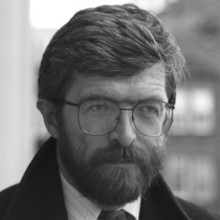Polish literature

Stanisław Barańczak
(1946-2014) was a poet, translator, literary critic, essayist, scholar, editor and lecturer. He studied Polish literature at the Adam Mickiewicz University in Poznań, where he became a lecturer and earned a PhD.
He made his debut as a poet and critic in 1965. Barańczak was on the editorial staff of the Poznań-based magazine Nurt from 1967 to 1971. After the political events of June 1976, he co-founded the Workers’ Defence Committee and the underground quarterly Zapis. He began lecturing on Polish literature at Harvard in 1981 and was the editor-in-chief of The Polish Review. In 1983 he co-founded the Paris-based literary journal Zeszyty Literackie, and was a regular contributor to the periodical Teksty Drugie. He was a leading poet in the New Wave generation, and one of the most outstanding Polish writers to make a literary debut during the communist period, combining literary and scholarly work with political action. He was the most prominent translator of English poetry into Polish and Polish poetry into English in the second half of the twentieth century. His Polish was permeated with the language of poets whom he felt particularly close to – Emily Dickinson, John Donne and Robert Frost – and whose work he tirelessly strove to popularise in Poland. In his own work, three dominant elements are clearly visible: ethical concerns, remarkable political passion and extraordinary linguistic dexterity. The topics he chose to write about, which testified to his commitment to social problems, were always accompanied by surprising linguistic fluency. It may seem paradoxical that Barańczak, who began as a poet and critic of language and social order, achieved his greatest success as a Parnassian at the end of the twentieth century, a virtuoso of poetic form. His book Chirurgiczna precyzja (Surgical Precision) won the Nike Award in 1999.
BIBLIOGRAPHY
poetry:
- Korekta twarzy, Poznań: Wyd. Poznańskie, 1968.
- Jednym tchem, Warszawa: Orientacja, 1970.
- Dziennik poranny, Poznań: Wyd. Poznańskie, 1972.
- Sztuczne oddychanie, Londyn: Aneks, 1978.
- Ja wiem, że to niesłuszne, Paryż: Instytut Literacki, 1977.
- Tryptyk z betonu, zmęczenia i śniegu, Kraków: KOS, 1980.
- Atlantyda i inne wiersze z lat 1981-85, Londyn: Puls, 1986.
- Widokówka z tego świata, Paryż: Zeszyty Literackie, 1988.
- Poezje wybrane, Warszawa: LSW, 1990.
- 159 wierszy 1968-88, Kraków: Znak, 1990.
- Podróż zimowa, Poznań: a5, 1994.
- Chirurgiczna precyzja, Kraków: a5, 1998.
- Wiersze zebrane, Kraków: a5, 2006
light verse:
- Biografioły: poczet 56 jednostek sławnych, sławetnych i osławionych, Poznań: a5, 1991.
- Zwierzęca zajadłość: z zapisków zniechęconego zoologa, Poznań: a5, 1991.
- Słoń, trąba i ojczyzna, Kraków: Znak, 1995.
- Fioletowa Krowa, Kraków: a5, 2007.
- Pegaz zdębiał, Warszawa: Prószyński i S-ka, 2008.
literary criticism:
- Nieufni i zadufani, Wrocław: Ossolineum, 1971.
- Ironia i harmonia, Warszawa: Czytelnik, 1973.
- Język poetycki Mirona Białoszewskiego, Wrocław: Ossolineum, 1974.
- Etyka i poetyka, Paryż: Instytut Literacki, 1979.
- Książki najgorsze 1975-80, Kraków: KOS, 1981.
- Uciekinier z utopii. O poezji Zbigniewa Herberta, Londyn: Polonia, 1984.
- Tablica z Macondo. Osiemnaście prób wytłumaczenia, po co i dlaczego się pisze, Londyn: Aneks, 1990.
- Ocalone w tłumaczeniu. Szkice o warsztacie tłumaczenia poezji, Poznań: a5, 1992.
- Poezja i duch Uogólnienia. Wybór esejów 1970-1995, Kraków: Znak, 1996.
TRANSLATIONS:
english:
- The Weight of the Body: Selected Poems, Chicago: Another Chicago Press / TriQuarterly, 1989.
- A fugitive from Utopia: The Poetry of Zbigniew Herbert, Harward University Press, 1987.
german: in anthologies:
- Lebenslauf aus Büchern und Blättern - Frankfurt am Main: Suhrkamp, 1990.
- Panorama der polnischen Literatur des 20. Jahrhunderts, Zürich: Ammann, 1997.
- Polnische Lyrik aus 100 Jahren, Gifkendorf: Merlin, 1997.
japanese:
- Porando bungaku-no okurimono, trans. Moriyasu Tatsuya, Tokyo: Kobunsha, 1990
russian:
- Polskie poèty XX veka, trans. Natalija Astafeva, Vladimir Britanišskij, Sankt-Peterburg: Aletejja, 2000.
serbian:
- Povratak kuci, Zoran Đeric, Banja Luka - Beograd: Zadužbina "Petar Kočic", 2002
spanish:
- Antología poética [Wybór poezji], trans. Antonio Benitez, Anna Sobieska, Gijón: Ediciones Trea, 2014.